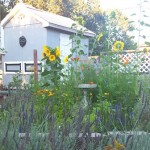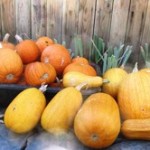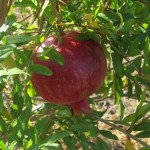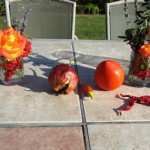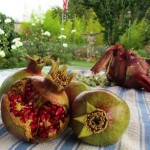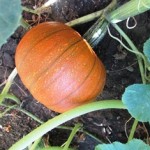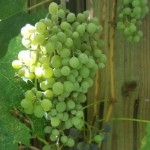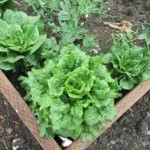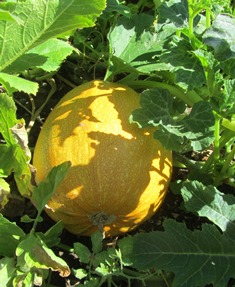In Nature Now, Fall Fruits Hang Like Jewels
On the Henny Penny Farmette, the signs of autumn’s arrival are evident almost everywhere in our orchard and garden.
I’ve made jams, cooked produce, and dried fruit. Of late, I’ve been harvesting heirloom seeds for next year’s garden. The birds will pick over what’s left and the soil can rest. Fall fruit now hangs on the trees in a showy splendor.
The pomegranate trees support a multitude of leathery-skinned, ruby-red fruit holding hundreds of sweet seeds. On the Fuyu and Hachiya persimmon trees, the golden fruits hang like ornaments. In the squash patch, French sugar pumpkins cling to dry, stringlike vines and you might find a butternut squash here or there.
I picked most of the late summer pears two weeks ago, putting a few in paper bags and storing them in a cabinet for two days. That allows them to reach the perfect ripeness for eating them fresh.
We grew corn this year, but the triple-digit heat and smoke from wildfires turned the lush, tall green plants to papery stalks before the corn really ripened. Still, before the stalks can now be composted, a few can be bundled together and placed in a porch corner to symbolize the arrival of Autumn and her festivals.
_________________________________________________________________________
If you enjoy reading about country living topics, check out my Henny Penny Farmette series of mysteries.
Also, I have written extensively about self-help, spirituality, and wellness. Find my books on Amazon, Barnes & Noble, Kobo Books, and everywhere books are sold, online or in brick-and-mortar stores.

More than 150 rituals for sound mind, strong body, and meaningful connections to the people around you
Simple Gratitude for the Harvest
It’s nearly Thanksgiving and our Henny Penny Farmette continues to bring forth delicious, organically grown edibles for our table for which we feel truly grateful.
We give thanks, too, for neighbors like Dan and Annie. This past Sunday, Annie carted to our house a box of persimmons and bags of apples and pomegranates. We harvested all our apples last month so her timing was great. While we have persimmons and pomegranates hanging on the trees in our small orchard, many are not yet ripe enough to pick.
Last month, I froze cubes of butternut squash in freezer bags and readied pumpkin flesh for pie. While picking a few ripe persimmons recently, I noticed that we’re sharing them with a visitor who seems to sneak in and munch during the night. I’m thinking the culprit could be a raccoon, opossum, skunk, squirrel, fox, or a gaggle of wild turkeys that seem to make an annual pilgrimage through our area.
The two main types of persimmons grown on our farmette are Fuyu and Hachiya. The Fuyu is rather squat-looking and Hachiya has an elongated shape. Both take on a bright orange color in the fall. When fully ripe, Fuyu is sweet and crunchy like an apple whereas the Hachiya is soft like jelly. Though commonly thought of as fruits, persimmon and pomegranate are technically berries.
Fuyu persimmons can be peeled, sliced, and eaten fresh, roasted, or tossed into salads. They add a vibrant splash of orange to a winter salad that could include slices of citrus and pear tossed with greens,walnuts, pomegranate seeds, and goat cheese.
Pomegranates are ripe when their leathery outer covering turns red and begins to crack. Inside each pomegranate is white tissue separating compartments of ruby-red seeds called arils.
The seeds are high in antioxidants that reduce inflammation and free radical damage. Though they are messy to remove, the pomegranate seeds are healthy and nutritious additions to any diet.
To preserve pomegranate seeds, freeze them on a baking sheet. Once frozen, slip the seeds into freezer bags and return to the freezer. The seeds can be kept frozen for months.
Pumpkins come in a variety of sizes and types. Personally, I prefer the sugar pumpkins for recipes calling for pumpkin as an ingredient.
This week as we prepare for the big feasting day of Thanksgiving, lots of cooks are already baking pumpkin pies. Many will use canned pumpkin as a shortcut to their pie preparation but pumpkin filling made from scratch is especially delicious.
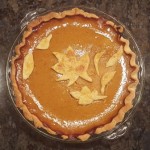
Our pumpkin pie features leaves of pie dough, brushed with egg, and sprinkled with sugar before baking
The old fashioned way to make pumpkin pie from scratch is to use fresh, organic pumpkin puree from the produce that you’ve grown in your garden. The process to make a pie takes longer because first the pumpkin must be peeled, seeded, and cut into manageable pieces and then cooked down. Then just follow your favorite pumpkin pie recipe.
_________________________________________________________________
Taking care of yourself is one of the most important things you can do over your lifetime and it starts with healthy ingredients and fresh produce.
My newest self-help wellness book is THE SELF-CARE PLANNER, A Weekly Guide to Prioritize You.
My books are available for purchase through online and traditional bookstores everywhere. Buy The Self-Care Planner and other titles offered by my publisher, Simon & Schuster online. Visit my author’s page at https://www.simonandschuster.com/authors/Meera-Lester/2137649823

It’s never too late to get healthy and live a richer, fuller, and more meaningful life. Self care is not selfish but rather an act of love.
YOU NEED THIS BOOK. WE ALL DO.
Buy it now from:
https://www.simonandschuster.com/books/The-Self-Care-Planner/Meera-Lester/9781507211649
Check out more recipes and tips for healthy country living in my Henny Penny Farmette series of cozy mysteries (Kensington Publishing, NY).
The Summer Garden Is Done, What’s Next?
My summer garden is wild and chaotic and bountiful at the beginning of the season. You’ll find fruit trees, vegetables, vines of melons, corn, and perennial lavender and other showy herbs and flowers. Like a grand dame of faded elegance, the garden has matured and looks a bit weary and spent now that Labor Day approaches.
Just because the peak growing season is coming to an end, it’s not the end of garden chores. The following tasks can be started now.
HARVEST AND STORE
For some crops, the harvesting goes on. Examples include tomatoes, potatoes, melons, and winter squashes like Butternut that store well. If you haven’t already harvested the garlic, it’s a good time to do that.
Cut sunflower seed heads and place them in a warm area to dry. Collect seeds from cosmos, nasturtiums, and other flowers to preserve for next year’s garden. Work out storage options, especially for food items to be harvested.
Snip summer table grapes and other varieties if they are ripe . . . or let them hang a while longer for extra sweetness.
CLEAR BEDS
Depleted, dying, or dried annuals can be dug, pulled, and composted now. If you plan to let the garden rest, plant a cover crop so the ground doesn’t become hard scrabble. The cover crop will feed the soil.
DO FALL PLANTING
If you intend to do a fall planting, take time now to enrich the earth with amendments. Turn and rake the garden soil. Put plants directly into the prepared earth and water well to get them off to a good start.
For quick second crop before the weather turns cold, plant greens such as spinach, kale, and arugula. Cool season crops like beets, broccoli, and cabbage can go directly into the ground now, too.
CUT FLOWER AND SEED HEADS
Cut flower heads of hydrangeas for drying. Insert plant markers near peonies and other perennials that will die completely back during winter. Gather bunches of mint and other herbs, tie with string, an hang in a cool, dark place to dry.
CREATE MULCH
Designate an area to create a new compost pile. Use garden detritus and fall leaves as the trees begin to drop their canopies to enter winter dormancy. The resulting mulch will enrich the soil for next year’s garden.
CHECK ON FALL PRODUCE
Pomegranates, persimmons, and pumpkins will soon be ripening. Ensure that these plants continue to get water. Check for pests and any signs that might indicate nutrient deficiencies that could show up in the leaves. Figure out your options for storing or gifting excess fruits and veggies. For example, pomegranates keep well in the fridge or remove the seeds and put into bags for freezing. Save and dry rinds for potpourri.
TURN THE SOIL IN GROW BOXES
Aerate and amend soil in grow boxes and raised beds for cool season crops. Do these chores before the rainy season and cool weather arrives. Your garden, like a young maiden who flourishes from attention, will produce bountiful vegetables, fruits, berries, and flowers during its next growing season.
_______________________________________________________________
If you enjoy reading about farmette topics, gardening, and keeping chickens and honeybees, check out my series of cozy mysteries from Kensington Publishing in New York.
Click on this link: http://tinyurl.com/ya5vhhpm
My newest nonfiction book is published by Adams Media/Simon & Schuster: http://tinyurl.com/y9vfw2t9
- Anyone can find peace, clarity, and focus…all it takes is a moment
Visit a Farm in the Fall For a U-Pick Experience
The Henny Penny Farmette is about a half hour away from Brentwood. There are at least fifty farms in and around Brentwood that offer families a U-Pick experience. The city is located in the eastern region of the San Francisco Bay Area.
Although Brentwood has had a post office since 1878, the city today is largely residential. That said, there are many actively producing farms and preserved lands around the pockets of community. The area has a semi-arid, Mediterranean climate and is situated on the alluvial plain of the Sacramento-San Joaquin Delta.
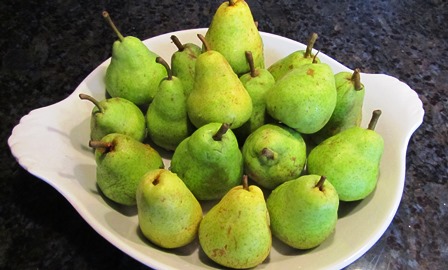
To bring out the maximum sweetness of pears, place them in a paper bag for two days in a kitchen cupboard
Many of the farms permit family picking of produce and tree crops. Some of the crops available for picking through October include apples, corn, figs, green beans, onions, peppers, pears, persimmons, pomegranates, pumpkins, squash, strawberries, and tomatoes. Additionally, walnuts, pistachios, and almonds are available year-round at some of the farm stands. There are also wineries and vineyards in the region.
As you drive around the area, look for a Brentwood Harvest Time sign as an indicator for a farm. There will be a number on the sign that coordinates to a name of a farm with that same number on a handily map that you can get at http://www.harvest4you.com. In July, the city hosts a harvest festival for the entire family. It features tractor rides and corn shucking and eating contests, among other activities.
Finally, if Christmas at your house wouldn’t be the same without a live tree, you can find Christmas tree farms in and around Brentwood as well on the Harvest4you.com website. Check it out.
U-pick guidelines as listed on the map include the following rules.
1. No climbing or damaging trees
2. Children are not allowed on ladders.
3. You must buy what you pick.
4. Check produce for ripeness before picking it.
5. Do not throw fruit.
6. Do not litter.
 Facebook
Facebook Goodreads
Goodreads LinkedIn
LinkedIn Meera Lester
Meera Lester Twitter
Twitter





